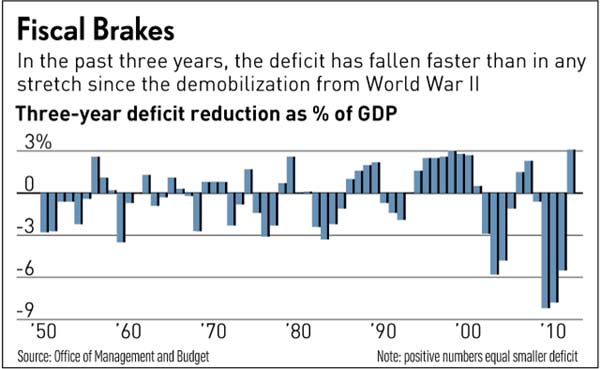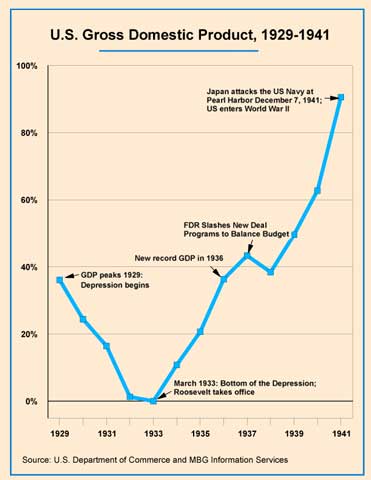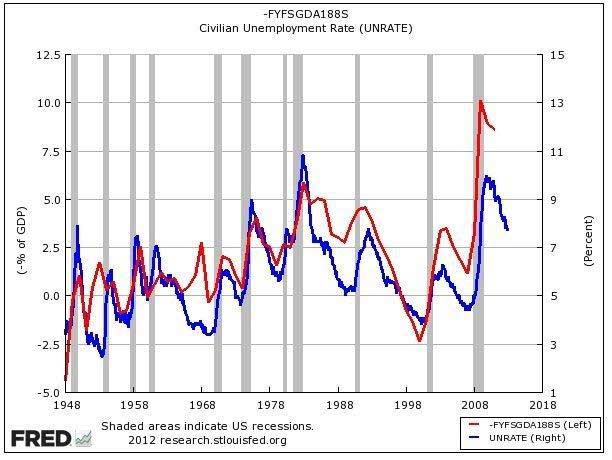Austerity is the absolute wrong answer for what ails the US economy – or even for reducing the deficit, argue Zeese and Flowers. There are real solutions.
In the last year of his life, the Rev. Dr. Martin Luther King Jr. shifted his focus to the American economy, poverty, full employment and how these issues related to militarism. In his 1967 speech, “Where do we go from here: chaos or community?” he urged the country to ask some tough questions and advocated for full employment or a guaranteed national income. He said:
. . . as we talk about ‘Where do we go from here,’ that we honestly face the fact that the movement must address itself to the question of restructuring the whole of American society. There are 40 million poor people here. And one day we must ask the question, ‘Why are there 40 million poor people in America?’ And when you begin to ask that question, you are raising questions about the economic system, about a broader distribution of wealth. When you ask that question, you begin to question the capitalistic economy…. One day we must come to see that an edifice which produces beggars needs restructuring. It means that questions must be raised. You see, my friends, when you deal with this, you begin to ask the question, ‘Who owns the oil?’ You begin to ask the question, ‘Who owns the iron ore?’ You begin to ask the question, ‘Why is it that people have to pay water bills in a world that is two-thirds water?’
Cheri Honkala, a poverty and housing activist who founded the Poor People’s Economic Human Rights Campaign, and who ran for vice president with the Green Party in 2012, sees her work following the path of Dr. King. She says, “There will be over one million families who will lose their homes to foreclosure or eviction in the upcoming year. I live on a block in Philadelphia where there are about 23 kids and we know that at least one week of each month many of these families will have inadequate food.”
Decades after Dr. King’s anti-poverty campaign, poverty and homelessness remain growing problems in the US economy and we must still ask the question: How do we restructure the economy so it works for people?
The Washington Consensus: A Bipartisan Call for Austerity
The Washington consensus on economic policy has been used to inflict neoliberalism, privatization and massive cuts to basic services on developing countries. When this is instituted in Europe, it is called austerity. In both Europe and Latin America, austerity resulted in large protests. In the United States, this is known as “bipartisanship on the deficit” and results in cuts to social programs. No matter what it is called, the end is the same: People’s basic necessities are not met; the economy shrinks and the wealth divide expands.
The consensus, driven by big banks and concentrated wealth through compliant politicians, has been trying to cut the meager social safety net in the United States and loot the economy. Over and over, President Obama has tried to makes cuts to Social Security and Medicare; thus far he has failed because people revolted. Now Obama says he wants to seek “common ground” with the Republicans on Medicare and there is agreement on a 3 percent cut to Social Security – a new Washington consensus.
The call for cuts ignores important facts about the economic reality many Americans face. The wealth divide continues to get starker. Corporate profits have increased 171 percent under Obama, the fastest profit growth since 1900, while America’s poorest lost 91 percent of their wealth.
At the same time, one in three working families cannot make ends meet, 50 million Americans live in poverty, seniors have higher credit card debt than youth in large part due to health costs, and one-third of Americans are likely to live in poverty during retirement. Students are graduating heavily in debt into a lousy job market. And housing problems are so severe that when housing vouchers were being given away in Michigan, thousands showed up – single moms, homeless and veterans – resulting in the event being cancelled.
The urgent economic problems the US and world face are lack of employment and an extreme wealth divide. Economist Joseph Stiglitz wrote that it is the wealth divide that is preventing economic recovery. Indeed, the wealth divide is so extreme that the annual income of the world’s 100 richest people could end global poverty four times over.
The Deficit Is Not as Serious as They Want You to Think
The bipartisan consensus in Washington does not face important facts: There is no serious immediate deficit problem. Actually, the US deficit is shrinking at the fastest pace since World War II, shrinking from 10.1 percent to 7 percent of the gross domestic product (GDP) during Obama’s first term. Economists are pleading with incoming Treasury Secretary Jacob Lew to acknowledge this. The truth is that the deficit problem, which is being used to justify cuts to Social Security, Medicare, Medicaid and other social programs, is well within control.

Even if it wasn’t in control, cuts are unnecessary. One of the few advantages of being an empire economy and holding the world’s dominant currency is that we could maintain a high debt-to-GDP ratio. Great Britain, when it was an empire, for more than a century had a debt to GDP ratio of more than 100 percent, sometimes over 200 percent. The US is not Greece. The American Empire does not have to starve people at home in order to enrich transnational corporations and oligarchs around the world. When our economy contracts, the government can create money to fill the gaps and when the economy grows, it can reduce the stimulus spending. In fact, the government could mint its own money and cut out the costs of the middlemen – the Federal Reserve and banks. Of course, an even better path for the American Empire would be to bring the troops home and invest in our domestic economy. This would create a more stable economy and strengthen our position as the world’s reserve currency.
Military Spending Can Be Cut
In his “Where do we go from here?” speech, Dr. King contrasted human needs with military spending:
John Kenneth Galbraith said that a guaranteed annual income could be done for about twenty billion dollars a year. And I say to you today, that if our nation can spend thirty-five billion dollars a year to fight an unjust, evil war in Vietnam, and twenty billion dollars to put a man on the moon, it can spend billions of dollars to put God’s children on their own two feet right here on earth.
Robert Pollin, co-director of the Political Economy Research Institute (PERI) and author of Back to Full Employment, points out that military spending has nearly doubled, now standing at 5 percent of GDP, compared to 3 percent in 2000. His research also shows the military is a very expensive way to create jobs; $1 billion in spending on the military creates about 11,200 jobs. That same $1 billion invested domestically would create 16,800 jobs through clean energy infrastructure, 17,200 jobs within the healthcare sector or 26,700 jobs in education. In other words, investments in clean energy, healthcare and education will produce between 50 percent and 140 percent more jobs than if the same money were spent by the Pentagon.
Unfortunately the Iraq and Afghanistan wars have been very expensive. Even if both wars were to end today, we would have billions in ongoing residual costs to pay for the expenses of treating veterans’ mental and physical wounds. Joseph Stiglitz and Linda Bilmes write: “The eventual costs of caring for veterans of the Afghanistan war will exceed $1 trillion. To put these numbers into perspective, the debate surrounding the fiscal cliff has centered on expenditure cuts over 10 years of $1 trillion to $2 trillion.”
But even with these expected costs, there is room to cut military spending. The Pentagon’s “base budget,” excluding the costs of the Iraq and Afghanistan wars, has grown by 40 percent over the past decade. There are multiple conservative military cost-cutting plans that would save $50 billion to $100 billion annually. The 1,100 US military outposts cost $170 billion annually. Billions could be saved by closing bases built in wars that are now over. Stopping cost overruns and the manufacturing of unnecessary weapons could save billions more. A Government Accountability Office (GAO) study of 96 weapons programs found that almost two-thirds suffered major cost overruns – 40 percent above contract prices, overall – totaling close to $300 billion. Cost overruns are equal to the amount of President Clinton’s last full military budget request a decade ago.
Cutting Spending Now Will Cause an “Obama Recession.” Full Employment Will Solve the Deficit
In the midst of this ongoing economic crisis the bipartisan view in Washington ignores these facts and insists on more cuts to social programs. Taking the approach of the bipartisan consensus will almost assuredly lead to an “Obama Recession,” just as FDR’s anti-deficit consensus, which cut New Deal spending in 1936, led to the “Roosevelt Recession” in 1937-38. The lesson of history is obvious, but the prescription of the bipartisan consensus does not operate on facts or evidence. It will bleed the patient even though the hoax of austerity is economic malpractice.

A more recent example of austerity measures causing the economy to worsen is happening in the UK right now. The last four years have produced the worst economic performance in a non-post-war period since records started being collected in the 1830s. Britain could be at the beginning of a triple-dip recession, their economy shrank 0.3 percent in the final quarter and manufacturers suffered their worst year since the financial crisis of 2008. David Cameron delivered on his campaign promise of austerity and the result has been a prolonged recession. Let’s hope that US policymakers learn from the mistakes of Great Britain and don’t repeat them.
Economists who are fact-based rather than purely ideological are telling policy-makers that publicWhere%20do%20we%20go%20from%20here:%20chaos%20or%20community?“%20he%20urged%20the%20country%20to%20ask%20some%20tough%20questions%20and%20advocated%20for%20full%20employment%20or%20a%20guaranteed%20national%20income.%20He%20said:
%20
%20
.%20.%20.%20as%20we%20talk%20about%20’Where%20do%20we%20go%20from%20here,’%20that%20we%20honestly%20face%20the%20fact%20that%20the%20movement%20must%20address%20itself%20to%20the%20question%20of%20restructuring%20the%20whole%20of%20American%20society.%20There%20are%2040%20million%20poor%20people%20here.%20And%20one%20day%20we%20must%20ask%20the%20question,%20’Why%20are%20there%2040%20million%20poor%20people%20in%20America?’%20And%20when%20you%20begin%20to%20ask%20that%20question,%20you%20are%20raising%20questions%20about%20the%20economic%20system,%20about%20a%20broader%20distribution%20of%20wealth.%20When%20you%20ask%20that%20question,%20you%20begin%20to%20question%20the%20capitalistic%20economy….%20One%20day%20we%20must%20come%20to%20see%20that%20an%20edifice%20which%20produces%20beggars%20needs%20restructuring.%20It%20means%20that%20questions%20must%20be%20raised.%20You%20see,%20my%20friends,%20when%20you%20deal%20with%20this,%20you%20begin%20to%20ask%20the%20question,%20’Who%20owns%20the%20oil?’%20You%20begin%20to%20ask%20the%20question,%20’Who%20owns%20the%20iron%20ore?’%20You%20begin%20to%20ask%20the%20question,%20’Why%20is%20it%20that%20people%20have%20to%20pay%20water%20bills%20in%20a%20world%20that%20is%20two-thirds%20water?’
%20
%20
Cheri%20Honkala,%20a%20poverty%20and%20housing%20activist%20who%20founded%20the%20Poor%20People’s%20Economic%20Human%20Rights%20Campaign,%20and%20who%20ran%20for%20vice%20president%20with%20the%20Green%20Party%20in%202012,%20sees%20her%20work%20following%20the%20path%20of%20Dr.%20King.%20She%20says,%20″There%20will%20be%20over%20one%20million%20families%20who%20will%20lose%20their%20homes%20to%20foreclosure%20or%20eviction%20in%20the%20upcoming%20year.%20I%20live%20on%20a%20block%20in%20Philadelphia%20where%20there%20are%20about%2023%20kids%20and%20we%20know%20that%20at%20least%20one%20week%20of%20each%20month%20many%20of%20these%20families%20will%20have%20inadequate%20food.”
%20
Decades%20after%20Dr.%20King’s%20anti-poverty%20campaign,%20poverty%20and%20homelessness%20remain%20growing%20problems%20in%20the%20US%20economy%20and%20we%20must%20still%20ask%20the%20question:%20How%20do%20we%20restructure%20the%20economy%20so%20it%20works%20for%20people?
%20
The%20Washington%20Consensus:%20A%20Bipartisan%20Call%20for%20Austerity
%20
The%20Washington%20consensus%20on%20economic%20policy%20has%20been%20used%20to%20inflict%20neoliberalism,%20privatization%20and%20massive%20cuts%20to%20basic%20services%20on%20developing%20countries.%20When%20this%20is%20instituted%20in%20Europe,%20it%20is%20called%20austerity.%20In%20both%20Europe%20and%20Latin%20America,%20austerity%20resulted%20in%20large%20protests.%20In%20the%20United%20States,%20this%20is%20known%20as%20″bipartisanship%20on%20the%20deficit”%20and%20results%20in%20cuts%20to%20social%20programs.%20No%20matter%20what%20it%20is%20called,%20the%20end%20is%20the%20same:%20People’s%20basic%20necessities%20are%20not%20met;%20the%20economy%20shrinks%20and%20the%20wealth%20divide%20expands.
%20
The%20consensus,%20driven%20by%20big%20banks%20and%20concentrated%20wealth%20through%20compliant%20politicians,%20has%20been%20trying%20to%20cut%20the%20meager%20social%20safety%20net%20in%20the%20United%20States%20and%20loot%20%20the%20economy.%20Over%20and%20over,%20President%20Obama%20has%20tried%20to%20makes%20cuts%20%20to%20Social%20Security%20and%20Medicare;%20thus%20far%20he%20has%20failed%20because%20people%20revolted.%20Now%20Obama%20says%20he%20wants%20to%20seek%20″common%20ground“%20with%20the%20Republicans%20on%20Medicare%20and%20there%20is%20agreement%20on%20a%203%20percent%20cut%20%20to%20Social%20Security%20-%20a%20new%20Washington%20consensus.
%20
The%20call%20for%20cuts%20ignores%20important%20facts%20about%20the%20economic%20reality%20many%20Americans%20face.%20The%20wealth%20divide%20continues%20to%20get%20starker.%20Corporate%20profits%20have%20increased%20171%20percent%20under%20Obama,%20the%20fastest%20profit%20growth%20since%201900,%20while%20America’s%20poorest%20lost%2091%20percent%20%20of%20their%20wealth.
%20
At%20the%20same%20time,%20one%20in%20three%20%20working%20families%20cannot%20make%20ends%20meet,%2050%20million%20Americans%20live%20in%20poverty,%20seniors%20have%20higher%20credit%20card%20debt%20%20than%20youth%20in%20large%20part%20due%20to%20health%20costs,%20and%20one-third%20of%20Americans%20are%20likely%20to%20live%20in%20poverty%20during%20retirement.%20Students%20are%20graduating%20heavily%20in%20debt%20into%20a%20lousy%20job%20market.%20And%20housing%20problems%20are%20so%20severe%20that%20when%20housing%20vouchers%20were%20being%20given%20away%20in%20Michigan,%20thousands%20showed%20up%20-%20single%20moms,%20homeless%20and%20veterans%20-%20resulting%20in%20the%20event%20being%20cancelled.
%20
The%20urgent%20economic%20problems%20the%20US%20and%20world%20face%20are%20lack%20of%20employment%20and%20an%20extreme%20wealth%20divide.%20Economist%20Joseph%20Stiglitz%20%20wrote%20that%20it%20is%20the%20wealth%20divide%20that%20is%20preventing%20economic%20recovery.%20Indeed,%20the%20wealth%20divide%20is%20so%20extreme%20that%20the%20annual%20income%20of%20the%20world’s%20100%20richest%20people%20could%20end%20global%20poverty%20four%20times%20over.
%20
The%20Deficit%20Is%20Not%20as%20Serious%20as%20They%20Want%20You%20to%20Think
%20
The%20bipartisan%20consensus%20in%20Washington%20does%20not%20face%20important%20facts:%20There%20is%20no%20serious%20immediate%20deficit%20problem.%20Actually,%20the%20US%20deficit%20is%20shrinking%20at%20the%20fastest%20pace%20since%20World%20War%20II,%20shrinking%20from%2010.1%20percent%20to%207%20percent%20of%20the%20gross%20domestic%20product%20(GDP)%20during%20Obama’s%20first%20term.%20Economists%20%20are%20pleading%20with%20incoming%20Treasury%20Secretary%20Jacob%20Lew%20to%20acknowledge%20this.%20The%20truth%20is%20that%20the%20deficit%20problem,%20which%20is%20being%20used%20to%20justify%20cuts%20to%20Social%20Security,%20Medicare,%20Medicaid%20and%20other%20social%20programs,%20is%20well%20within%20control.
%20
(INSERT%20GRAPH%20#1)
%20
Even%20if%20it%20wasn’t%20in%20control,%20cuts%20are%20unnecessary.%20One%20of%20the%20few%20advantages%20of%20being%20an%20empire%20economy%20and%20holding%20the%20world’s%20dominant%20currency%20is%20that%20we%20could%20maintain%20a%20high%20debt-to-GDP%20ratio.%20Great%20Britain,%20when%20it%20was%20an%20empire,%20for%20more%20than%20a%20century%20had%20a%20debt%20to%20GDP%20ratio%20of%20more%20than%20100%20percent,%20sometimes%20over%20200%20percent.%20The%20US%20is%20not%20Greece.%20The%20American%20Empire%20does%20not%20have%20to%20starve%20people%20at%20home%20in%20order%20to%20enrich%20transnational%20corporations%20and%20oligarchs%20around%20the%20world.%20When%20our%20economy%20contracts,%20the%20government%20can%20create%20money%20to%20fill%20the%20gaps%20and%20when%20the%20economy%20grows,%20it%20can%20reduce%20the%20stimulus%20spending.%20In%20fact,%20the%20government%20could%20mint%20its%20own%20money%20and%20cut%20out%20the%20costs%20of%20the%20middlemen%20-%20the%20Federal%20Reserve%20and%20banks.%20Of%20course,%20an%20even%20better%20path%20for%20the%20American%20Empire%20would%20be%20to%20bring%20the%20troops%20home%20and%20invest%20in%20our%20domestic%20economy.%20This%20would%20create%20a%20more%20stable%20economy%20and%20strengthen%20our%20position%20as%20the%20world’s%20reserve%20currency.
%20
Military%20Spending%20Can%20Be%20Cut
%20
In%20his%20″Where%20do%20we%20go%20from%20here?”%20speech,%20Dr.%20King%20contrasted%20human%20needs%20with%20military%20spending:
%20
%20
John%20Kenneth%20Galbraith%20said%20that%20a%20guaranteed%20annual%20income%20could%20be%20done%20for%20about%20twenty%20billion%20dollars%20a%20year.%20And%20I%20say%20to%20you%20today,%20that%20if%20our%20nation%20can%20spend%20thirty-five%20billion%20dollars%20a%20year%20to%20fight%20an%20unjust,%20evil%20war%20in%20Vietnam,%20and%20twenty%20billion%20dollars%20to%20put%20a%20man%20on%20the%20moon,%20it%20can%20spend%20billions%20of%20dollars%20to%20put%20God’s%20children%20on%20their%20own%20two%20feet%20right%20here%20on%20earth.
%20
%20
Robert%20Pollin,%20co-director%20of%20the%20Political%20Economy%20Research%20Institute%20(PERI)%20and%20author%20of%20Back%20to%20Full%20Employment,%20points%20out%20that%20military%20spending%20has%20nearly%20doubled,%20now%20standing%20at%205%20percent%20of%20GDP,%20compared%20to%203%20percent%20in%202000.%20His%20research%20also%20shows%20the%20military%20is%20a%20very%20expensive%20way%20to%20create%20jobs;%20$1%20billion%20in%20spending%20on%20the%20military%20creates%20about%2011,200%20jobs.%20That%20same%20$1%20billion%20invested%20domestically%20would%20create%2016,800%20jobs%20through%20clean%20energy%20infrastructure,%2017,200%20jobs%20within%20the%20healthcare%20sector%20or%2026,700%20jobs%20in%20education.%20In%20other%20words,%20investments%20in%20clean%20energy,%20healthcare%20and%20education%20will%20produce%20between%2050%20percent%20and%20140%20percent%20more%20jobs%20than%20if%20the%20same%20money%20were%20spent%20by%20the%20Pentagon.
%20
Unfortunately%20the%20Iraq%20and%20Afghanistan%20wars%20have%20been%20very%20expensive.%20Even%20if%20both%20wars%20were%20to%20end%20today,%20we%20would%20have%20billions%20in%20ongoing%20residual%20costs%20to%20pay%20for%20the%20expenses%20of%20treating%20veterans’%20mental%20and%20physical%20wounds.%20Joseph%20Stiglitz%20and%20Linda%20Bilmes%20write:%20″The%20eventual%20costs%20of%20caring%20for%20veterans%20of%20the%20Afghanistan%20war%20will%20exceed%20$1%20trillion.%20To%20put%20these%20numbers%20into%20perspective,%20the%20debate%20surrounding%20the%20fiscal%20cliff%20has%20centered%20on%20expenditure%20cuts%20over%2010%20years%20of%20$1%20trillion%20to%20$2%20trillion.”
%20
But%20even%20with%20these%20expected%20costs,%20there%20is%20room%20to%20cut%20military%20spending.%20The%20Pentagon’s%20″base%20budget,”%20excluding%20the%20costs%20of%20the%20Iraq%20and%20Afghanistan%20wars,%20has%20grown%20by%2040%20percent%20%20over%20the%20past%20decade.%20There%20are%20multiple%20conservative%20military%20cost-cutting%20plans%20that%20would%20save%20$50%20billion%20to%20$100%20billion%20annually.%20The%201,100%20US%20military%20outposts%20cost%20$170%20billion%20annually.%20Billions%20could%20be%20saved%20by%20closing%20bases%20built%20in%20wars%20that%20are%20now%20over.%20Stopping%20cost%20overruns%20and%20the%20manufacturing%20of%20unnecessary%20weapons%20could%20save%20billions%20more.%20A%20Government%20Accountability%20Office%20(GAO)%20study%20of%2096%20weapons%20programs%20found%20that%20almost%20two-thirds%20suffered%20major%20cost%20overruns%20-%2040%20percent%20above%20contract%20prices,%20overall%20-%20totaling%20close%20to%20$300%20billion.%20Cost%20overruns%20are%20equal%20to%20the%20amount%20of%20President%20Clinton’s%20last%20full%20military%20budget%20request%20a%20decade%20ago.
%20
Cutting%20Spending%20Now%20Will%20Cause%20an%20″Obama%20Recession.”%20Full%20Employment%20Will%20Solve%20the%20Deficit
%20
In%20the%20midst%20of%20this%20ongoing%20economic%20crisis%20the%20bipartisan%20view%20in%20Washington%20ignores%20these%20facts%20and%20insists%20on%20more%20cuts%20to%20social%20programs.%20Taking%20the%20approach%20of%20the%20bipartisan%20consensus%20will%20almost%20assuredly%20lead%20to%20an%20″Obama%20Recession,”%20just%20as%20FDR’s%20anti-deficit%20consensus,%20which%20cut%20New%20Deal%20spending%20in%201936,%20led%20to%20the%20″Roosevelt%20Recession”%20in%201937-38.%20The%20lesson%20of%20history%20is%20obvious,%20but%20the%20prescription%20of%20the%20bipartisan%20consensus%20does%20not%20operate%20on%20facts%20or%20evidence.%20It%20will%20bleed%20the%20patient%20%20even%20though%20the%20hoax%20of%20austerity%20is%20economic%20malpractice.
%20
(INSERT%20GRAPH%20#2)
%20
A%20more%20recent%20example%20of%20austerity%20measures%20causing%20the%20economy%20to%20worsen%20is%20happening%20in%20the%20UK%20right%20now.%20The%20last%20four%20years%20have%20produced%20the%20worst%20economic%20performance%20in%20a%20non-post-war%20period%20since%20records%20started%20being%20collected%20in%20the%201830s.%20Britain%20could%20be%20at%20the%20beginning%20of%20a%20triple-dip%20recession,%20their%20economy%20shrank%200.3%20percent%20in%20the%20final%20quarter%20and%20manufacturers%20suffered%20their%20worst%20year%20since%20the%20financial%20crisis%20of%202008.%20David%20Cameron%20delivered%20on%20his%20campaign%20promise%20of%20austerity%20and%20the%20result%20has%20been%20a%20prolonged%20recession.%20Let’s%20hope%20that%20US%20policymakers%20learn%20from%20the%20mistakes%20of%20Great%20Britain%20and%20don’t%20repeat%20them.
%20
Economists%20who%20are%20fact-based%20rather%20than%20purely%20ideological%20are%20telling%20policy-makers%20that%20public%20investment%20in%20jobs%20will%20restore%20growth%20of%20the%20economy%20and%20resolve%20the%20deficit.%20Stiglitz%20prescribes%20a%20comprehensive%20response%20that%20should%20include,%20at%20the%20least,%20significant%20investments%20in%20education,%20a%20more%20progressive%20tax%20system%20and%20a%20tax%20on%20financial%20speculation.%20Economist%20Robert%20Pollin%20urges%20a%20goal%20of%20full%20employment%20by%202016%20and%20reducing%20poverty%20from%2015%20percent%20to%2011%20percent,%20the%20level%20in%202000,%20which%20he%20shows%20are%20achievable%20goals.%20RoseAnn%20DeMoro%20of%20National%20Nurses%20United%20urges%20a%20poverty%20program%20that%20begins%20with%20stopping%20cuts%20to%20Social%20Security%20and%20expanding%20improved%20Medicare%20to%20all.%20As%20Robert%20Reich%20says,%20Medicare%20isn’t%20the%20problem%20it’s%20the%20solution.
%20
Indeed,%20decades%20of%20history%20show%20that%20the%20national%20deficit%20parallels%20unemployment.%20In%20other%20words,%20the%20lower%20the%20unemployment%20rate,%20the%20lower%20the%20deficit%20will%20be%20in%20relation%20to%20the%20GDP.%20This%20chart%20shows%20the%20deficit%20as%20a%20percentage%20of%20GDP%20(red%20line)%20vs.%20the%20unemployment%20rate%20(blue%20line)%20and%20indicates%20the%20only%20way%20to%20solve%20the%20deficit%20problem%20is%20to%20solve%20the%20employment%20problem%20first.
%20
(INSERT%20GRAPH%20#3)
%20
Of%20course,%20creating%20a%20full%20employment%20economy%20also%20ameliorates%20poverty%20and%20homelessness.%20And%20it%20will%20not%20make%20the%20wealthier%20poorer.%20On%20the%20contrary,%20putting%20Americans%20to%20work%20to%20meet%20the%20many%20needs%20of%20the%20nation%20for%20infrastructure,%20health%20care,%20education%20and%20green%20energy%20will%20create%20more%20opportunities%20for%20businesses%20to%20profit.%20It%20will%20also%20allow%20the%20United%20States%20to%20have%20the%20resources%20to%20create%20the%20clean%20energy,%20sustainable%20economy%20that%20is%20urgently%20needed%20as%20part%20of%20a%20Green%20New%20Deal.
%20
Let%20Us%20Be%20Dissatisfied
%20
In%20Washington,%20DC,%20the%20two%20corporate%20parties%20that%20each%20ran%20billion-dollar%20presidential%20campaigns%20do%20not%20hear%20these%20calls%20and%20are%20immune%20to%20the%20facts%20on%20which%20they%20are%20based.%20Life%20in%20the%20United%20States%20continues%20to%20get%20harder%20for%20the%20vast%20majority.%20In%201988,%20the%20US%20ranked%20first%20in%20the%20world%20as%20the%20country%20to%20live%20in;%20today%20we%20have%20dropped%20to%2016th.
%20
How%20do%20we%20stop%20the%20madness%20in%20Washington?%20We%20organize%20and%20mobilize%20against%20austerity%20and%20for%20prosperity,%20for%20a%20new%20clean%20energy%20economy%20and%20a%20democratic%20economy%20that%20empowers%20the%20people%20fairly.%20We%20have%20the%20power,%20we%20must%20exercise%20it.
%20
Dr.%20King%20concluded%20his%201967%20speech%20urging%20people%20to%20go%20out%20with%20″divine%20dissatisfaction.”%20He%20pointed%20to%20many%20problems%20Americans%20still%20face%20today:%20poverty,%20homelessness,%20the%20wealth%20divide%20and%20mass%20spending%20on%20war.%20Despite%20our%20dissatisfaction,%20King%20urged,%20″We%20must%20walk%20on%20in%20the%20days%20ahead%20with%20an%20audacious%20faith%20in%20the%20future.”
%20
You%20can%20hear%20our%20interview%20with%20Cheri%20Honkala%20and%20Robert%20Pollin%20on%20Martin%20Luther%20King,%20the%20Poor%20Peoples’%20Campaign%20and%20Green%20Jobs%20on%20Clearing%20the%20FOG%20Radio.
%20
This%20is%20Part%20I%20in%20a%20series%20on%20the%20deficit%20and%20real%20solutions.%20Next%20week%20we%20examine%20how%20Social%20Security%20and%20Medicare%20are%20the%20solutions,%20not%20the%20problems,%20and%20need%20to%20be%20expanded%20not%20contracted.
” > investment in jobs will restore growth of the economy and resolve the deficit. Stiglitz prescribes a comprehensive response that should include, at the least, significant investments in education, a more progressive tax system and a tax on financial speculation. Economist Robert Pollin urges a goal of full employment by 2016 and reducing poverty from 15 percent to 11 percent, the level in 2000, which he shows are achievable goals. RoseAnn DeMoro of National Nurses United urges a poverty program that begins with stopping cuts to Social Security and expanding improved Medicare to all. As Robert Reich says, Medicare isn’t the problem it’s the solution.
Indeed, decades of history show that the national deficit parallels unemployment. In other words, the lower the unemployment rate, the lower the deficit will be in relation to the GDP. This chart shows the deficit as a percentage of GDP (red line) vs. the unemployment rate (blue line) and indicates the only way to solve the deficit problem is to solve the employment problem first.

Of course, creating a full employment economy also ameliorates poverty and homelessness. And it will not make the wealthier poorer. On the contrary, putting Americans to work to meet the many needs of the nation for infrastructure, health care, education and green energy will create more opportunities for businesses to profit. It will also allow the United States to have the resources to create the clean energy, sustainable economy that is urgently needed as part of a Green New Deal.
Let Us Be Dissatisfied
In Washington, DC, the two corporate parties that each ran billion-dollar presidential campaigns do not hear these calls and are immune to the facts on which they are based. Life in the United States continues to get harder for the vast majority. In 1988, the US ranked first in the world as the country to live in; today we have dropped to 16th.
How do we stop the madness in Washington? We organize and mobilize against austerity and for prosperity, for a new clean energy economy and a democratic economy that empowers the people fairly. We have the power, we must exercise it.
Dr. King concluded his 1967 speech urging people to go out with “divine dissatisfaction.” He pointed to many problems Americans still face today: poverty, homelessness, the wealth divide and mass spending on war. Despite our dissatisfaction, King urged, “We must walk on in the days ahead with an audacious faith in the future.”
You can hear our interview with Cheri Honkala and Robert Pollin on Martin Luther King, the Poor People’s Campaign and Green Jobs on Clearing the FOG Radio.
This is Part I in a series on the deficit and real solutions. Next week we examine how Social Security and Medicare are the solutions, not the problems, and need to be expanded not contracted.
Join us in defending the truth before it’s too late
The future of independent journalism is uncertain, and the consequences of losing it are too grave to ignore. To ensure Truthout remains safe, strong, and free, we need to raise $27,000 in the next 24 hours. Every dollar raised goes directly toward the costs of producing news you can trust.
Please give what you can — because by supporting us with a tax-deductible donation, you’re not just preserving a source of news, you’re helping to safeguard what’s left of our democracy.